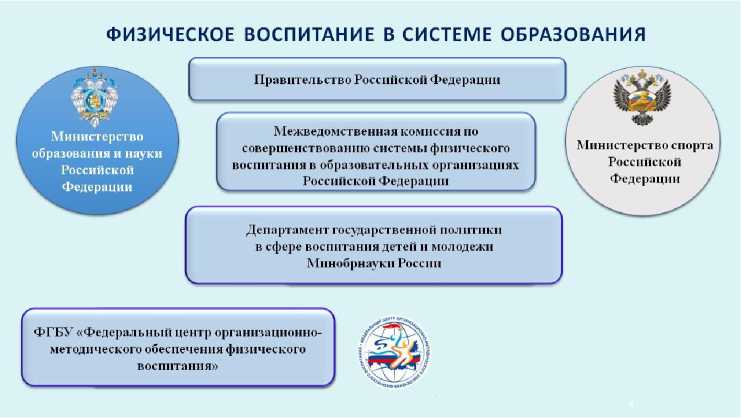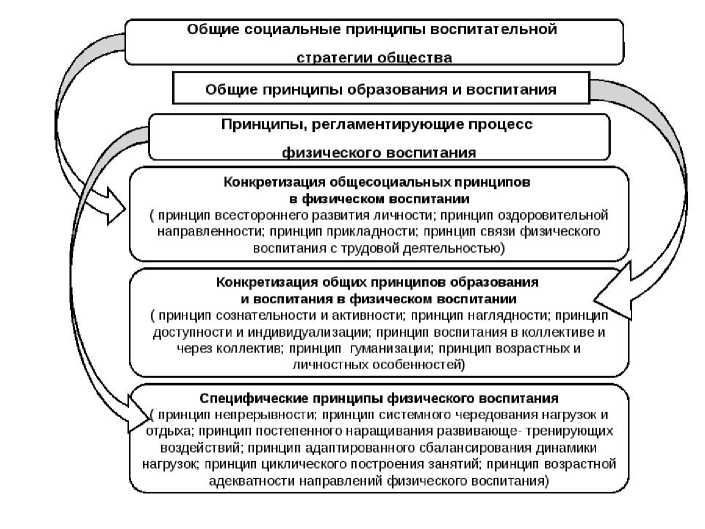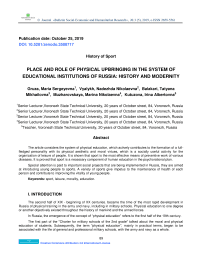Place and Role of Physical Upbringing in the System of Educational Institutions of Russia: History and Modernity
Автор: Gruza Maria Sergeyevna, Vyalykh Nadezhda Nikolaevna, Balakari Tatyana Mikhailovna, Muzharovskaya Marina Nikolaevna, Kutuzova Irina Albertovna
Журнал: Bulletin Social-Economic and Humanitarian Research @bulletensocial
Статья в выпуске: 3 (5), 2019 года.
Бесплатный доступ
The article considers the system of physical education, which actively contributes to the formation of a full-fledged personality with its physical aesthetic and moral virtues, which is a socially useful activity for the organization of leisure of people. It is shown that sport is the most effective means of preventive work of various diseases. It is proved that sport is a necessary component of human education in the psychorational plan.Special attention is paid to important social projects that are being implemented in Russia, they are aimed at introducing young people to sports. A variety of sports give impetus to the maintenance of health of each person and contribute to improving the vitality of young people.
Sport, leisure, morality, education
Короткий адрес: https://sciup.org/14114699
IDR: 14114699 | DOI: 10.5281/zenodo.3508717
Текст научной статьи Place and Role of Physical Upbringing in the System of Educational Institutions of Russia: History and Modernity
The second half of XIX - beginning of XX centuries. became the time of the most rapid development in Russia of physical training in the army and navy, including in military schools. Physical education to one degree or another objectively existed throughout the history of mankind and the armed forces.
In Russia, the emergence of the concept of “physical education” refers to the first half of the 19th century.
The first part of the "Charter for military schools of the 2nd grade" talked about the moral and physical education of students. Subsequently, the term "physical education", mainly in practical terms, began to be associated with the life of general and professional military schools, with the army and navy as a whole.
In their work, the authors proceed from the fact that in the study period the concept of “physical education” in military schools included combat training, fencing, horseback riding, swimming, dancing, physical labor (in cadet corps and military gymnasiums), gymnastics, and sports. Therefore, a historical analysis of the main areas of activity of the country's military leadership to improve physical training in Russian military schools in the second half of the XIX - early XX centuries. A comprehensive analysis of materials and events has been carried out, which represents a solution to a scientific problem that has important theoretical and practical significance for Russian military science and military-political structures.
II. METHODOLOGY
The methodological basis of the article is an integrated approach to the study of the entire array of sources and literature on this issue. Moreover, the authors proceeded from the fundamental principles of the theory of scientific knowledge, the accumulated experience of the methodology of the increment and enrichment of knowledge in all areas of social and natural sciences on the basis of modern achievements of domestic and world theoretical thought.
The authors of the article relied on the scientific principles and methods of historical knowledge, and first of all, on the universal dialectical methodology, which allows the researcher to consider the historical process in all its versatility, interconnectedness and interdependence.
In their work, the authors were guided by the principles of objectivity and historicism. General scientific methods, methods of other social sciences and actually historical methods are used. The authors relied on such historical methods as the method of historical parallels, historical-genetic, historical-comparative, historical-typological, synchronous, chronological methods and others.
III. RESULTS
The study of the axiological, theoretical, methodological, ontological aspects of physical culture as a value-humanistic basis for the quality of life of modern society, life-affirming personality dominance is an urgent task of socio-philosophical analysis.
At the same time, in matters of social and humanitarian knowledge, scientists are more interested in the life of the mind, in the development of creative arts, in which the human spirit, consciousness, and mind naturally find the most direct expression. The human body, perfected by a system of physical exercises, remains for the most part aloof from ongoing research. The role of physical culture, its significance in the life of a particular person is only discussed, including at the highest levels, but does not find practical application.

In accordance with this, the solution to the problems of physical culture cannot be achieved only by developing new-fangled methods of physical exercises, using modern diets to give the body appropriate, but often distorted, proportions, visiting ultramodern fitness centers, etc. The problem is complex, requiring scientific justification in various branches of knowledge. Unfortunately, the stage of understanding the essence of physical culture related to its influence on the spiritual sphere of a person, as an effective means of intellectual, moral and aesthetic impact, has not yet been properly applied and used in science. Achieving quality of life is possible by various means. Someone seeks to enrich themselves with material wealth. Yes, that’s perfectly acceptable. One who does not have the means of living cannot be happy. Someone strive to surpass themselves in mastering the profession, studying various sciences.
This is also natural. But there is another way, bodily improvement of the personality, which so far is not reflected in the structure of the worldview of the individual, public consciousness and has not received an adequate value understanding from all the main groups of our society. The desire of man to improve the quality of life is a natural need for life. Transform the existing reality, find in it value-based foundations, ideals, landmarks subject to an active personality, constantly sensing the horizons of its achievements.
Особенности отечественной системы физического воспитания в вузе
-
■ Обязательность
-
■ Доступность
-
■ Единство стандартов и планов
-
■ Унификация программ по физическому воспитанию
Physical culture is fundamentally connected with movement, whether it is special physical exercises or other bodily practices. And the movement ultimately contributes to qualitative changes in objective reality. Dialectical materialism relates movement to absolute givenness, and peace is always relative. Therefore, the movement (appropriate and reasonable) should always be accompanied by progress.

Конкретизация общих принципов образования # и воспитания в физическом воспитании
( принцип сознательности и активности; принцип наглядности; принцип доступности и индивидуализации; принцип воспитания в коллективе и через коллектив; принцип гуманизации; принцип возрастных и личностных особенностей)
Специфические принципы физического воспитания
\( принцип непрерывности; принцип системного чередования нагрузок и отдыха; принцип постепенного наращивания развивающе- тренирующих воздействий; принцип адаптированного сбалансирования динамики нагрузок; принцип циклического построения занятий; принцип возрастной адекватности направлений физического воспитания)
Конкретизация общесоциальных принципов в физическом воспитании
(принцип всестороннего развития личности; принцип оздоровительной направленности; принцип прикладности; принцип связи физического воспитания с трудовой деятельностью)
Общие социальные принципы воспитательной
_____________ стратегии общества ____________
Принципы, регламентирующие процесс
_______ физического воспитания ______
Общие принципы образования и воспитания
The people, in accordance with their moral and ethnic requirements, used all kinds of means of physical education to forge strong characters and the will of young people, who saw the main purpose of their existence in their readiness to protect their people, their homeland. In modern conditions, the study of an integral and rich system of folk means of physical education developed over the centuries will bring undoubted benefit to the teaching teams today, who will be able to apply the best traditions of folk experience in the physical and moral education of children, enrich the sports world of students with interesting forms and techniques. Such an important pedagogical feature — folk games — as their gradation in accordance with the physiological and age characteristics of the players deserves special discussion. Another, no less important feature should be called a reasonable combination of physical and mental education. The use of recitative in the game not only served as its emotional background, but also significantly contributed to the development of mental activity, since a prerequisite for participation in the game was memorization and clear pronunciation of recitative - which trained the child’s memory and speech, steady attention.
IV. CONCLUSION
In recent years, one of the effective forms of sports and humanistic education of youth has been mass comprehensive international cultural and sporting events for children and youth, contributing to the creation of new associations of young people, which are an incentive for attracting youth to classes, which creates new conditions for intensifying the fight against child crime, drug addiction and alcoholism. All these measures make it possible to attract large financial resources for the development of the material and technical base of children and youth sports, to identify opportunities for creating new organizational structures for the development of youth sports movement.


